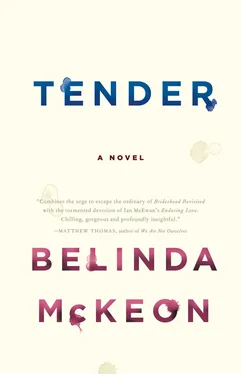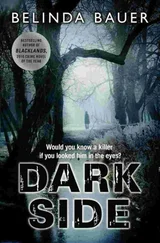Also there was one of the William Scott still lifes of pans and bowls — Catherine had told James about Scott’s work in one of her letters — and a postcard of a piece by a Japanese artist — she had forgotten his name — which consisted just of a date, April 12 1975, painted in white on a black background, and a photo of a photographer making a daguerreotype, and a Cartier-Bresson portrait of Samuel Beckett, his face a clutch of long, deep wrinkles, his mouth pursed, his eyes sharp and fixed on something out of frame. Also, a postcard of three young black boys, naked, running, kicking and splashing into the sea. Their thin arms were outstretched; the soles of their feet were lifted to the camera, smooth and calm. Catherine was staring at them, her mug of red wine in one hand, when James came up behind her, putting his arms around her waist and resting his chin on her shoulder. She jumped at his touch, but in the next moment settled back against him. She felt the same flood of guilt that she felt every time he hugged her now, every time he cuddled her and nuzzled her in the way it came so naturally to him to do; she felt the wretchedness of wanting him not to stop doing it, not to detach from her again and open back out to a space which was shared with other people. The others, chatting and laughing on the other side of the room, were paying them no heed, but Catherine felt as conscious of their presence, and as bothered by it, as though they had been standing here at James’s wall of pictures as well, pulling at him, pulling him away from her. She closed her eyes, willing the feeling to pass, to lift off her, like an insect or a virus, and decide on somebody else instead; she felt exhausted from the turmoil and shame of carrying it with her everywhere, at every moment.
“Hello,” James said softly, sweetly, and he tightened his grip around her. “Why are you loitering over here like you’re up to no good?”
Her heart pounded. She picked an image at random and pointed to it. “What’s the story with this one?” she said, the sentence not even sounding like a question, her words sounding limp and uninterested and tired.
But James did not notice. He responded happily and eagerly, telling her everything he knew.
Later, Lisa from PhotoSoc persuaded James to show them some of the photographs he had been taking himself over the last couple of weeks, and some of the photographs he had taken in Berlin, and he resisted for a few minutes, but then caved, grinning and shaking his head, going to the drawer where he kept his folders. Cillian, who had had more wine than anyone else, cheered loudly, and Amy and Zoe cleared a space in the middle of the floor so that James could lay the photos out for everyone, crouched and kneeling around him, to see.
The first few were from Berlin, and as James started to leaf through them, Catherine hung back a little, because she had seen them before; they had been taken in Malachy’s studio, of Malachy, potbellied and bearded, at work, standing behind a huge camera on a tripod, and of the people who were posing for him; several of them were naked, which caused Cillian to cheer again, and to elbow past Aidan for a look at the women. James’s angle on Malachy’s subjects was, by necessity, not the angle for which the subjects, gazing towards Malachy’s lens, were prepared, and the effect was disorienting; often, the faces were hidden, the limbs jutting out at odd angles. In a photo which Catherine particularly liked, a woman had, while twisting herself in a pose for Malachy, spotted James with his own camera, standing well off to the side; he had captured perfectly the moment of surprise and self-consciousness on her face. James did not comment on the photograph this time, but turned to the next, which was of another naked subject of Malachy’s, this time a young man, dark-haired and striking, one arm raised high over his head. His legs were long and muscular, his buttocks high; from the side angle, his dick was a small, protruding blob high on one thigh. Like the woman’s, his gaze was to the side, latched on to that of James’s camera — but, unlike the woman, he did not look shocked or embarrassed. He stared.
Catherine stared too. She had not seen this photograph before. James must have added it to the folder only recently; it had not been there when he had shown her his Berlin photographs in Baggot Street.
“Who’s that?” she said, crawling forward, but at the same moment Cillian, who was on his hunkers beside her, let out another cheer.
“Wahoo, Jimbo,” he said, clapping James on the back. “You were fucking well in there, what?!”
James smirked. “I don’t think so, Cillian,” he said, going to turn the page, but Zoe put out a hand to stop him.
“He’s bloody gorgeous, ” she squealed, craning her neck to look at the photograph more closely.
“Who is he?” Catherine said again, a jump of urgency in her voice now, which James seemed to catch; he glanced at her cautiously.
“That’s Florian. A young friend of Malachy’s.”
The way he had said book that afternoon looking at the guy in Hodges Figgis was the same way in which he had now said young friend —as though it was something despicable, something laughable, something the very taste of which he wanted to wash out of his mouth. As Cillian and Zoe and the girls made further comments on Florian and James’s photographing of him, James went again to turn to the next sheet, but now something came to Catherine, the realization of it hitting her like a wall of sound, and this time she was the one to reach out and stop him.
“Wait a minute,” she said, her fingers tight around his wrist. “You mentioned Florian to me in a letter, didn’t you? Wasn’t Florian the guy who asked you out to the pub?”
The reaction to this from the others was loud and delighted; Cillian roared as wildly as though he was at a football match, and Zoe and the girls made noises like police sirens, and Lisa laughed, and Aidan sat back on his heels and watched James, grinning, seeming almost proud. But James shook his head hurriedly, irritably, and swatted Catherine’s hand away.
“No, no,” he said, moving to the next image. “That wasn’t Florian. You must be mistaken. You must be mixing up the names.”
“I’m not mixing up the names,” Catherine said, offended. “I wrote to you about Florian. I told you that you should have gone with him. I told you that you—”
She stopped, feeling suddenly almost dizzy with confusion. Was this the same Florian? How many guys with that kind of name, after all, could there have been? Had James said anything more about him in that letter? Could he have told her about taking his photograph, taking his naked photograph, for Christ’s sake, and could she have missed it, skimmed over it, ignored it? She had, the uneasy truth was, skimmed over plenty in his letters, looking for the funny parts, the parts that were responses to her own life, the parts she had preferred to read; but could she possibly have missed such a detail? No, she did not think so, did not believe so; which meant that James was lying to her. And what did that mean? How much else, then, did that mean James was concealing? And yet, all that he was denying was what Catherine knew to be the case, which was that this guy — this gorgeous, naked guy, his skin glistening, his muscles taut — had asked James to come for a drink, and James, in James’s nervous, frightened way, had stupidly declined. And Catherine had chided him for that. So what was she feeling so awful about? What was this panic, this — it felt almost like anger — rushing through her? As James moved to another folder now, seeming to have decided not to risk showing any more of the photographs from Berlin, as he started to show the new Dublin photographs, the strangers from Grafton Street, the familiar faces from college, what Catherine was reeling with felt absurdly like a sense of betrayal. What was wrong with her? She got to her feet, stumbling across Aidan as the others turned to him, laughing and exclaiming, in reaction to James’s sullen, sharp-eyed portrait of him; standing, frowning, against the gray stone of the Campanile, his hands thrust into the pockets of his army jacket, Aidan looked like the guy in the Wolfgang Tillmans photograph.
Читать дальше












